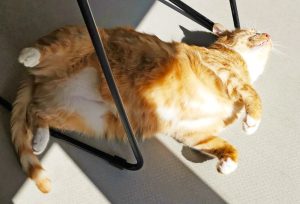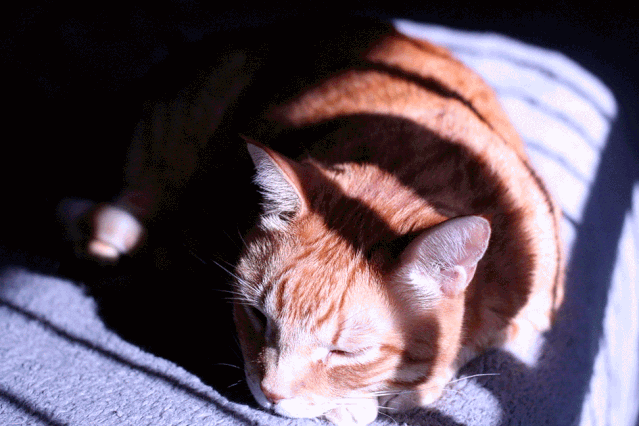Cats really love sunbathing. Whether they’re indoor or outdoor cats, long-haired, short-haired, or even hairless, you’ll always find a cat basking in the sun. Especially in summer, it’s common to see cats lounging in the sun while the air conditioner is on. Some people even joke that cats are like “plants that need sunlight to photosynthesize.” But what are the benefits of sunbathing for cats? Why do they love it so much?
-
The Many Benefits of Sunbathing for Cats
Providing a Source of Heat: Cats are warm-blooded animals, and they can maintain their body temperature through metabolic heat production. However, if there is additional heat radiation (like sunlight), it helps them conserve their precious energy. This is why some wild cats will: sunbathe → absorb heat → reduce energy expenditure → lower calorie intake → and minimize the need for hunting. So, in a way, if your cat loves sunbathing, it’s actually saving you some cat food!Vitamin D Supplementation: A study by the University of California found that cats cannot produce vitamin D3 in the same way humans do by exposing their skin to sunlight. However, sunbathing helps cats “consume” more vitamin D. Under sunlight, their sebaceous glands produce more oil, and some of the vitamin precursors in this oil are converted into vitamin D. When cats groom their fur, they ingest this vitamin D.Promoting Better Sleep: A 2017 study found that melatonin, which is produced in response to the retina and pineal gland, regulates a cat’s sleep cycle and improves sleep quality. Early studies believed that melatonin was only produced at night by the pineal gland. However, new research in 2019 revealed that only about 5% of melatonin comes from the pineal gland, while the other 95% is produced in response to sunlight, through the mitochondria of cells. So, by sunbathing, your cat can sleep for 12 to 20 hours a day.Relaxing and Fighting Depression: First of all, the increase in melatonin helps not just with sleep, but also alleviates depression. In addition, an Australian study pointed out that exposure to sunlight boosts serotonin levels in the body, helping regulate mood and appetite. An Austrian study also found that when daylight hours increase with the changing seasons, the brain releases more dopamine, improving the cat’s mood.Boosting Immunity: Researchers at Georgetown University found that moderate sun exposure can enhance a cat’s immune system and skin resistance. Low-intensity blue light in sunlight activates peroxide, which helps T-cells in the immune system move quickly and stay alert against bacterial invaders. UV rays also help fight off skin bacteria and parasites, reducing the risk of skin diseases.In summary: Sunbathing helps keep cats healthier and happier, which is why they naturally love it!

-
Beware of Overexposure to the Sun
Although sunbathing has many benefits, excessive exposure to sunlight can be harmful to your cat:Dehydration: Some cats love to lay in the sun all day without eating or drinking, which can easily lead to dehydration. Mild dehydration might not be visible to the naked eye, but as it worsens, you might notice symptoms like frequent licking, dry and sticky mouth, sunken eyes, slow skin recoil, lethargy, and more.Heatstroke: High temperatures, especially in hot and humid environments, can cause heatstroke. Common symptoms include increased body temperature, faster breathing and heartbeat, panting, vomiting, sudden collapse, and even fainting.Sunburn: In the early stages of sunburn, a cat’s exposed areas may just appear slightly red, which is easily overlooked by owners. As the sunburn worsens, symptoms such as hair loss, redness, swelling, pain, and blisters may appear. Due to the pain, cats may scratch the affected area, leading to bleeding and infection. If untreated, severe sunburns can lead to actinic keratosis, squamous cell carcinoma, and other serious conditions. So, while it’s important to let your cat enjoy the sun, be cautious about overexposure.
-
5 Tips to Help Your Cat Safely Enjoy the Sun
Create Shade in Preferred Areas: Especially for older or overweight cats who may be too lazy to move, keeping them in one spot for too long can increase the risk of sunburn. If your cat likes to lounge on the balcony or windowsill, consider partially drawing the curtains or placing a box to block the sun.Control Sun Exposure Time: Try to avoid letting your cat sunbathe from 10 a.m. to 4 p.m. when the sun is at its strongest. If you have electric curtains, you can control them remotely for a set amount of time, or close curtains facing the south, leaving windows on other sides of the house open for sunbathing.Avoid High Temperatures: Ensure proper ventilation and dehumidification. High temperatures and humidity can increase the risk of heatstroke. If the temperature is moderate, open windows for ventilation; if humidity is high, use air conditioning or a dehumidifier; if it’s too hot, consider installing a cooling system that can be controlled remotely.Provide Plenty of Water: Cats sunbathing can become quite lazy, so if their water bowl is far away, they might not want to get up to drink. It’s a good idea to place a water bowl near their sunbathing area, and you can even add ice cubes to the water when you leave the house.Don’t Shave Your Cat: Shaving a cat might seem like a way to keep them cool, but it actually removes their protective fur layer, which can make them more susceptible to sunburn. If your cat has thick or long fur, you can trim it slightly (about 2 cm) to thin it out, but never shave it!
Lastly, a Final Reminder: Never Use Human Sunscreen on Your Cat!Human sunscreens often contain ingredients like octinoxate, zinc oxide, and other chemicals that are effective for protecting human skin from the sun. However, when applied to a cat’s skin, these ingredients can be harmful. If your cat licks it off, it could lead to poisoning! So, let your cat enjoy their sunbathing safely and happily — without any human sunscreen!





